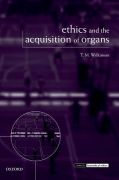
Transplantation is a medically successful and cost-effective way to treat people whose organs have failed--but not enough organs are available to meet demand. T. M. Wilkinson explores the major ethical problems raised by policies for acquiring organs. Key topics include the rights of the dead, the role of thefamily, and the sale of organs. Transplantation is a medically successful andcost-effective way to treat people whose organs have failed--but not enough organs are available to meet demand. Ethics and the Acquisition of Organs is concerned with the major ethical problems raised by policies for acquiring organs. The main topics are the rights of the dead, the role of the family, opt in and opt out systems, the conscription of organs, living organ donation from adults and children, directed donation andpriority for donors, and the sale of organs.In this ground-breaking work, T. M. Wilkinson uses concepts from moral and political theory such as autonomy, rights, posthumous interests, justice, and well-being, in a context informed by the clinical, legal, and policy aspects of transplantation. The result is a rigorous philosophical exploration of real problems and options. He argues that the ethics of acquiring organs for transplantation is not only of great intellectual interest, but also of practical importance. As such, this book willbe of profit not only to students and academics who work in applied ethics and bioethics, but also to the lawyers, policy-makers, clinicians, and lobby groups interested in transplantation. INDICE: INTRODUCTION TRANSPLANTATION AND RIGHTS OVER OUR BODIES THE POSSIBILITY OF POSTHUMOUS HARM THE MORAL CLAIMS OF THE DEAD THE DEAD AND THEIR FAMILIES CONSENT AND UNCERTAINTY ABOUT THE WISHES OF THE DEAD CONSCRIPTION LIVING DONOR ORGAN TRANSPLANTATION IMPARTIALITY, ACQUISITION, AND ALLOCATION ORGANS AND MONEY Bibliography Index
- ISBN: 978-0-19-960786-0
- Editorial: Oxford University
- Encuadernacion: Cartoné
- Páginas: 224
- Fecha Publicación: 24/11/2011
- Nº Volúmenes: 1
- Idioma: Inglés
